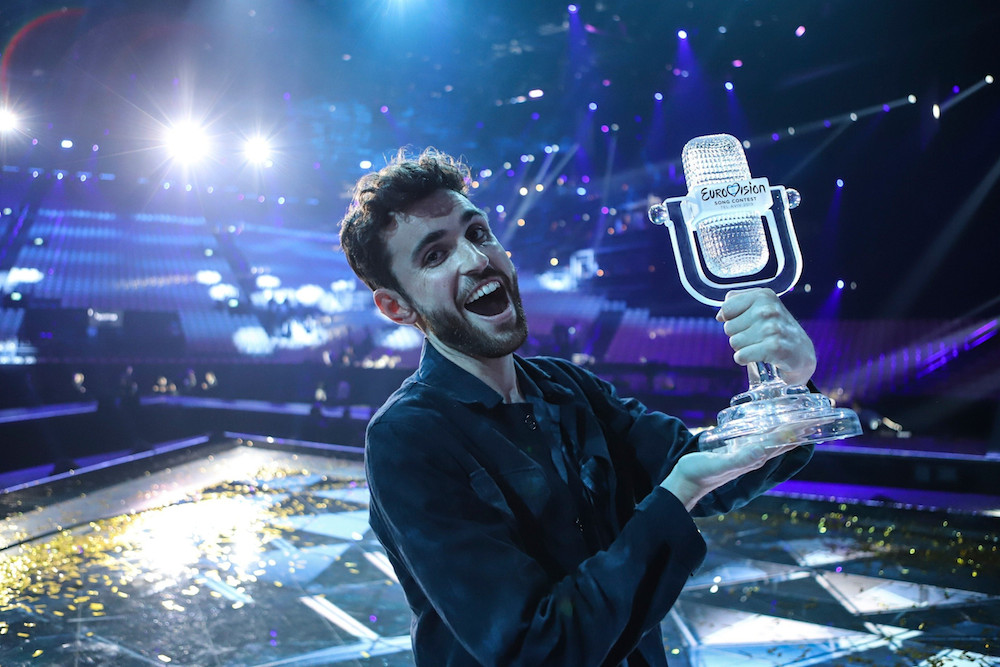Cities queue up for chance to stage next year’s Eurovision Song Contest

 The final chords of Duncan Laurence’s victory-lap performance of Arcade had barely fallen silent on Sunday morning as Dutch cities began jostling for the right to stage next year’s Eurovision Song Contest.
The final chords of Duncan Laurence’s victory-lap performance of Arcade had barely fallen silent on Sunday morning as Dutch cities began jostling for the right to stage next year’s Eurovision Song Contest.
The Hague, Maastricht and Zwolle are among the towns that have said they are keen to host the first Eurovision on Dutch soil for 40 years, in the wake of Laurence’s triumph in Tel Aviv.
Ruud van Diedenhoven, of the World Forum Theatre in The Hague, said the city that held the event in 1976 and 1980 was the obvious choice for 2020. He told Nieuwsuur the Cars Jeans stadium, ADO Den Haag’s home ground, would be and ideal choice: ‘It doesn’t have a roof, but there are ways of solving that. The Hague is waiting for the song contest, and song contest – this is The Hague!’
One thing the organisers won’t be enjoying is an influx of public money, after prime minister Mark Rutte immediately ruled out giving the state broadcaster NOS a Eurovision windfall. The bill is estimated at around €30 million, but Rutte told WNL Zondag: ‘That can come out of the budget, adding that Sweden put the event on for €15 million in 2016.
Sietse Bakker, event supervisor of the Eurovision Song Contest for NOS until 2016, said hosting the event was a ‘huge logistical operation‘, but also a chance for prospective host cities to boost their image.
‘If you want to organise Eurovision in your city, you need a good venue and a lot of hotel rooms. The city where it takes place will be the winner. It’ll get lots of good publicity and tourism, and that means income.
He added that the organisers could count on recouping most of their outlay in income from the event. ‘Think about ticket sales, the host city’s contribution and the contributions of the 40 participating broadcasters who all have to pay to take part.’
‘Everywhere but Urk’
Danny Damman, of the Ziggo Dome in Amsterdam, said he believed his venue could stage the event more efficiently than Expo Tel Aviv. ‘We already have the galleries here, they had to build them and that takes days. The fact they’re already here will mean lower costs, so we can set it up faster and cheaper.’
Damman added that the applications from towns and cities had begun flooding in in the 24 hours after Laurence’s win. ‘I think the village hall in Urk is about the only place that hasn’t put itself forward,’ he said.
Jolanda Jansen, of Ahoy in Rotterdam, said the venue had plenty of experience of staging major concerts. ‘We’ve had a sneak peek at the diary and we should be able to do it with a bit of creative rejigging to free up the concert hall and the spaces around it.’
Rob van der Wiel, argued that the Mecc exhibition centre in Maastricht, where the treaty was signed in 1992, was a natural choice for Eurovision. ‘For this opportunity to raise the profile of our city we will pull out all the stops to host it,’ he said.
Willem Uitentuis, of the IJsselhallen in Zwolle, said his venue was ready to welcome the Eurovision party. ‘We have plenty of options between mid-April and the end of May,’ he said.
Thank you for donating to DutchNews.nl.
We could not provide the Dutch News service, and keep it free of charge, without the generous support of our readers. Your donations allow us to report on issues you tell us matter, and provide you with a summary of the most important Dutch news each day.
Make a donation